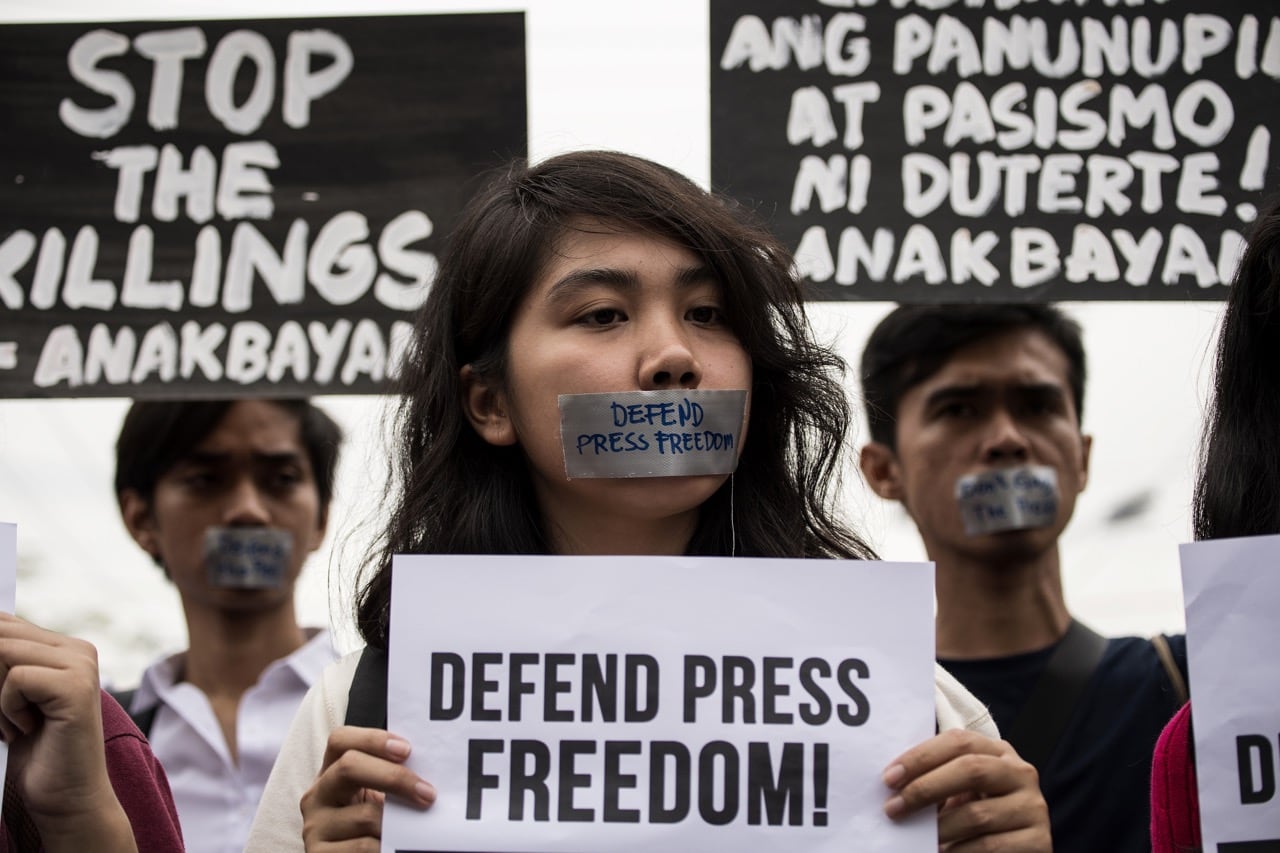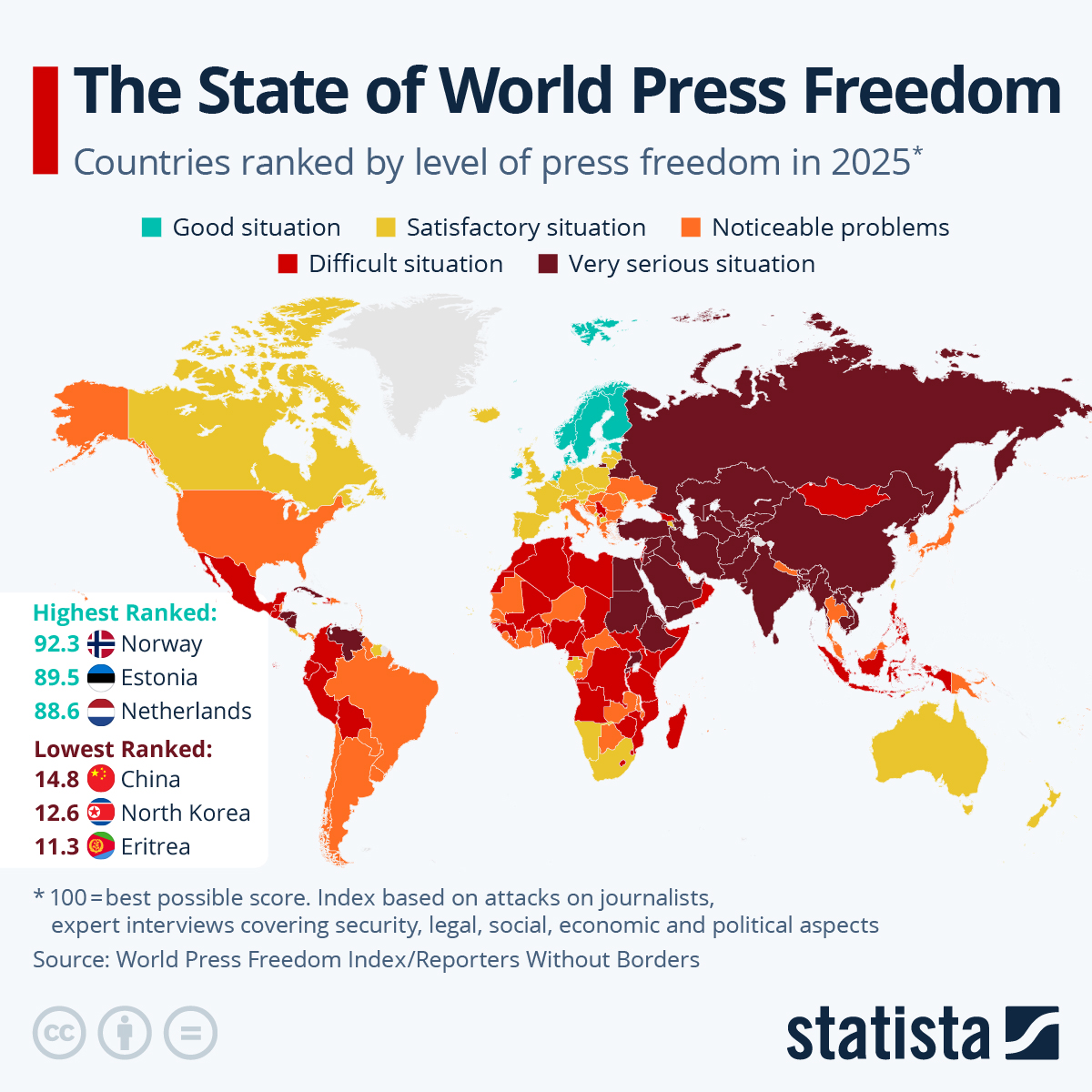India is ranked 159th in the 2024 Press Freedom Index, indicating a minor gain over the previous year.

What is Reporters Without Borders?

The internationally renowned non-profit organization Reporters Without Borders (RSF), also known as Reporters sans frontières (RSF) in French, is dedicated to protecting journalistic freedom and the right to free speech. RSF was established in 1985 by Robert Ménard, Rémy Loury, and Jacques Molénat. Its guiding principles are to support independent journalism, stand up against censorship and persecution, and defend journalists who are in danger.
With its consultative status, RSF can interact with international organizations on matters related to press freedom at the United Nations, the Council of Europe, the International Organization of the Francophonie, and the United Nations Educational, Scientific, and Cultural Organization (UNESCO). The organization’s goal goes beyond simple advocacy; through emergency relief, safety training, and legal support, it actively assists journalists who are in danger.
What is the Press Freedom Index?

RSF provides an extensive evaluation of press freedom worldwide every year in its Press Freedom Index. It assigns a ranking to 180 nations according to factors such as the degree of media freedom, the legal system, censorship, transparency, and violence against journalists.
The technique employed by RSF entails a comprehensive examination of the legal framework, media plurality, and incidents of violence or abuse directed towards journalists in every nation. The resulting rankings show both advancements and obstacles in this essential component of democracy by offering a comparative overview of press freedom in various countries.
The nations that rank highest on the Press Freedom Index serve as role models for maintaining press freedom and promoting independent journalism. Norway tops the list every time, with its robust legal system, open government, and active media scene.
Top 10 Countries with Best Press Freedom Index
The highest-ranking countries on the Press Freedom Index lead by example as the nations that maintain the highest degree of press freedom and exercise the right to freedom of speech and expression that ensures the independence of journalism.
The Top 10 Countries With The Best Press Freedom Index Are –
- Norway- 1st rank
- Denmark- 2nd rank
- Sweden- 3rd rank
- Netherlands- 4th rank
- Finland- 5th rank
- Estonia- 6th rank
- Portugal- 7th rank
- Ireland- 8th rank
- Switzerland- 9th rank
- Germany- 10th rank
Transparency, accountability, and the defence of journalists’ rights are given top priority in these countries, which promote an atmosphere that allows media outlets to function freely without worrying about retaliation or censorship. Strong legal safeguards, a pluralistic media environment, and popular support for journalists all contribute to their high Press Freedom Index scores.

Top 10 Countries with Worst Press Freedom Index
On the other hand, maintaining press freedom and safeguarding the safety of journalists present serious issues for the nations that rank lowest in the Press Freedom Index. Eritrea’s authoritarian government, which strictly regulates the media and stifles criticism, leads to its continuous low ranking on the list.
The top 10 countries with the worst Press Freedom Index are-
- Eritrea- 180th rank
- Syria- 179th rank
- Afghanistan- 178th rank
- North Korea- 177th rank
- Iran- 176th rank
- Turkmenistan- 175th rank
- Vietnam- 174th rank
- Bahrain- 173rd rank
- China- 172nd rank
- Myanmar- 171st rank
Journalists in these nations are always in danger of being harassed, imprisoned, or even killed because of their work. Government censorship, restrictive regulations, and the impunity of attacks on journalists create an environment of fear and self-censorship. These factors significantly restrict the freedom of expression and information access.
India’s jump with two ranks in World Press Freedom Index 2024
In recent years, India’s ranking in the World Press Freedom Index has come under examination and discussion. India is ranked 159th in the 2024 index, indicating a minor gain over the previous year. Even while this can appear like growth, it’s important to understand India’s placement in relation to larger regional and global patterns.
India, the largest democracy in the world, has several obstacles when it comes to upholding press freedom and defending the rights of journalists. Reports of violence, intimidation, and censorship directed towards journalists have sparked worries about the nation’s media independence. Furthermore, the emergence of social media and digital media has brought up new difficulties, such as the dissemination of false information and online harassment directed at journalists.
Comparison of India’s Press Freedom Index Over 10 Years
A review of India’s press freedom index for the previous ten years shows both advancements and regressions. Although there have been isolated examples of improvement, such as India’s modest gain in the 2024 index, press freedom has mostly been stagnating or declining.
Government censorship, legal challenges to media freedom, and attacks on journalists by non-state actors are some of the factors driving this trend. Furthermore, the politicization of media ownership and advertising revenue in the world’s largest democracy has highlighted questions concerning editorial independence and journalistic integrity.
Unveiling the Global Press Freedom Scenario
Penetrating deep into global media environments, the most recent findings from the Press Freedom Index provide a clear picture of the struggles and victories that journalists face everywhere.
-
Asia-Pacific region
Journalism is a dangerous career in the broad Asia-Pacific area that is in close proximity to India. These five countries—Burma, China, North Korea, Vietnam, and Afghanistan—are among the top ten most dangerous places for media workers and serve as sobering reminders of the dangers that journalists encounter on a daily basis. Each of these countries has unique difficulties, ranging from censorship to open violence against reporters. Interestingly, none of the countries in the region made it into the top 15 of the Index this year, which is quite worrisome.
-
Middle Eastern and North African region
The situation is terrible in the turbulent Middle East and North Africa, where over half of the nations face serious problems with press freedom. The United Arab Emirates has joined Yemen, Saudi Arabia, Iran, and other sombre nations in the red zone. Sadly, occupied Palestine, which is often bombarded and caught in the middle of fighting, is ranked lowest on the Index, a sobering reminder of the dangers that journalists encounter. In the middle of all of this turmoil, Qatar stands out as the one nation where things don’t qualify as “very serious” or “difficult.”
-
Europe: A Haven of Press Freedom
In sharp contrast, all of the “good” press-freedom nations are tucked away within the European Union, making Europe a stronghold of press freedom. The European Union has demonstrated its commitment to maintaining the independence and integrity of journalism by passing the first media freedom statute (EMFA). Interestingly, Germany maintains its place in the top ten, while Sweden rises to prominence, displacing Ireland in the top three. However, difficulties continue, with Greece, Malta, and Hungary struggling with dwindling press freedom.
Changing Political Landscape
The nations at the top of the World Press Freedom Index show how much the political environment influences press freedom around the globe. A longtime supporter of press freedom, Norway has seen a decline in its political score, which is indicative of larger changes in policy and administration. In the meantime, Sweden and Denmark have taken the lead in the European Union, replacing Ireland, which was formerly at the forefront. The downward trend in the political IIndex serves as a depressing reminder of how precarious press freedom is in a society that is always changing.
An essential tool for assessing media freedom around the world, the Press Freedom Index highlights both achievements and challenges in the continuous fight to protect the inalienable right to free speech.
Protecting press freedom is crucial because journalists must continue to travel through dangerous territory in their quest for truth and responsibility.
Press Freedom in War-Stricken Countries

Because it can be difficult to report in unstable situations, press freedom is particularly difficult in conflict areas like Israel-Palestine and Ukraine-Russia. Both state and non-state groups frequently use violence, intimidation, and censorship against journalists working in these regions.
While reporting on the continuing violence and humanitarian issues in Israel and Palestine, journalists run the risk of being arrested, harassed, and even physically harmed. The Israeli government’s restrictions on media access to the West Bank and Gaza make it more difficult for reporters to do their jobs honestly and impartially.
In a similar vein, both armed separatist organizations and government forces in Ukraine and Russia threaten journalists. In response to the annexation of Crimea and the ongoing crisis in eastern Ukraine, there has been a rise in media outlet attacks, censorship, and harassment of journalists who criticize the government.
Journalists continue to risk their lives to report on conflicts and humanitarian crises despite these obstacles, underscoring the significance of press freedom in advancing accountability, transparency, and human rights.
Changing Landscape of Indian Media Under Current Government

Under the leadership of Prime Minister Narendra Modi and the Bharatiya Janata Party (BJP), the Indian media landscape has experienced notable transformations. Although the media landscape in India is dynamic and diverse, there have been concerns expressed regarding the decline in press freedom and media outlets’ independence.
Allegations have been made against the Modi administration regarding government meddling in editorial choices, suppression of dissenting opinions, and assaults on journalists thought to be against the establishment. Press freedom in the nation has been further weakened by the use of defamation lawsuits and sedition legislation to muzzle dissident voices.
In addition, the growth of social networking sites and digital media has created new obstacles to media freedom in India. The concepts of free speech and democracy are in danger because the propagation of false information and hate speech on the internet has exacerbated polarization and intolerance.
Notwithstanding these obstacles, Indian media outlets and journalists continue to defy political pressure and fulfil their social responsibility as watchdogs. In India and around the world, international organizations such as RSF, activists, and civil society groups are vital in promoting press freedom and safeguarding journalists’ rights.
Is There a Threat to Democracy with Slipping Press Freedom Index?

The deteriorating press freedom index seriously threatens the global democratic movement, including that of India. Press freedom is a key component of democratic governance, promoting accountability and openness, acting as a check on governmental power, and fostering educated public discourse.
Press freedom declines citizens’ ability to obtain trustworthy information, hold their leaders responsible, and engage meaningfully in democratic processes. Censorship, attacks on media organizations, and intimidation of journalists undercut democracy’s values. These actions also diminish public confidence in institutions.
In India, the erosion of press freedom raises concerns about the health of its democracy and the ability of journalists to execute their crucial function as watchdogs of society. Democracy cannot flourish, and citizens’ rights and liberties are at risk without a free and independent press.
The Way Forward
The Press Freedom Index reveals a vibrant tapestry of victories and setbacks influencing the state of the media around the world. The path towards a free and vibrant press is full of opportunities and challenges. It begins in the hallowed halls of Europe, where press freedom is regarded as an exemplar of democratic values. It continues in the turbulent regions of Asia-Pacific and the Middle East, where journalists must regularly navigate dangerous waters.
When we consider the past and present, it is clear that there is still a long way to go in the fight for press freedom. Despite progress in certain areas, the threat of violence, intimidation, and censorship persists, clouding journalism’s critical function of bringing varied viewpoints to the attention of authority and holding them accountable.
Governments, civic society, and international organizations need to step up their efforts to protect press freedom and create an atmosphere that allows journalists to flourish in the future. By supporting legislative reforms, promoting media literacy, and welcoming technology advancements that empower rather than stifle, we can create a future where the press is a ray of democracy, accountability, and truth for future generations.



